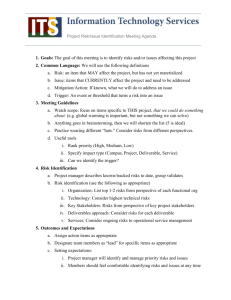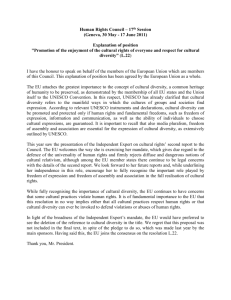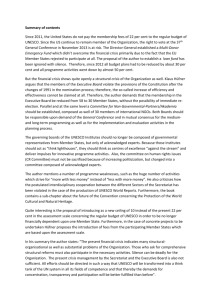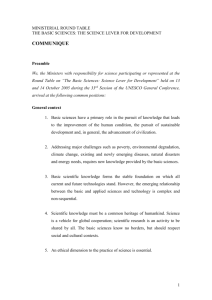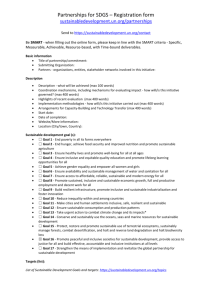Guidelines for the Complementary Additionnal Programme
advertisement
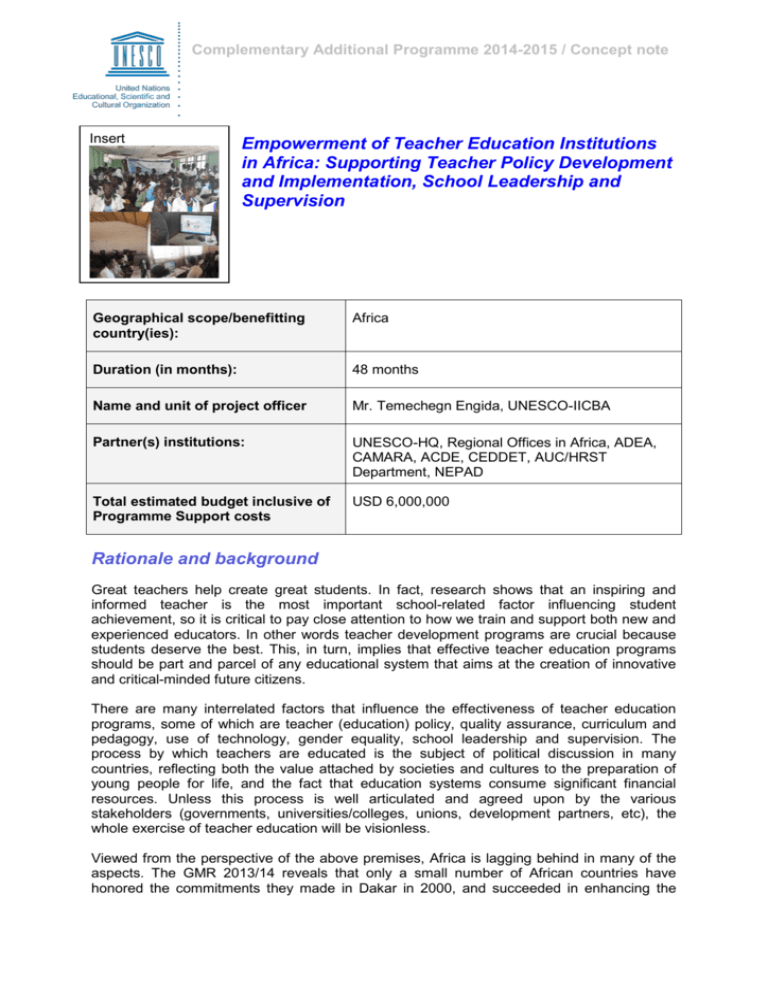
Complementary Additional Programme 2014-2015 / Concept note Insert Empowerment of Teacher Education Institutions in Africa: Supporting Teacher Policy Development and Implementation, School Leadership and Supervision Geographical scope/benefitting country(ies): Africa Duration (in months): 48 months Name and unit of project officer Mr. Temechegn Engida, UNESCO-IICBA Partner(s) institutions: UNESCO-HQ, Regional Offices in Africa, ADEA, CAMARA, ACDE, CEDDET, AUC/HRST Department, NEPAD Total estimated budget inclusive of Programme Support costs USD 6,000,000 Rationale and background Great teachers help create great students. In fact, research shows that an inspiring and informed teacher is the most important school-related factor influencing student achievement, so it is critical to pay close attention to how we train and support both new and experienced educators. In other words teacher development programs are crucial because students deserve the best. This, in turn, implies that effective teacher education programs should be part and parcel of any educational system that aims at the creation of innovative and critical-minded future citizens. There are many interrelated factors that influence the effectiveness of teacher education programs, some of which are teacher (education) policy, quality assurance, curriculum and pedagogy, use of technology, gender equality, school leadership and supervision. The process by which teachers are educated is the subject of political discussion in many countries, reflecting both the value attached by societies and cultures to the preparation of young people for life, and the fact that education systems consume significant financial resources. Unless this process is well articulated and agreed upon by the various stakeholders (governments, universities/colleges, unions, development partners, etc), the whole exercise of teacher education will be visionless. Viewed from the perspective of the above premises, Africa is lagging behind in many of the aspects. The GMR 2013/14 reveals that only a small number of African countries have honored the commitments they made in Dakar in 2000, and succeeded in enhancing the status, morale and professionalism of teachers. Much remains to be done in achieving decent work conditions, adequate remuneration, and access to professional development for all teachers. Between 2011 and 2015, sub-Saharan Africa needs to recruit about 225,000 additional teachers per year to achieve universal primary education by 2015. Sub-Saharan Africa accounts for 57% of the global total need for additional primary school teachers, or 63% if the deadline is extended to 2030. Teachers need not only to be recruited but also to be trained. Many countries have expanded their teacher labor force by engaging untrained teachers on contract. It should be noted that training in-service teachers whose skills do not meet minimum standards will add further pressure on systems with limited resources. Recognizing the fact that there is a global learning crisis, the GMR argues that strong national policies that make teaching quality and learning a high priority are essential to ensure that all children in school actually obtain the skills and knowledge they are meant to acquire. As a result, the GMR underlines the importance of having a comprehensive teacher policy at the national level and identifies four key strategies that governments must adopt to ensure that all students have access to a good teacher: 1) attracting the most qualified candidates into the teaching profession; 2) providing them with appropriate skills through quality and relevant initial and in-service training, and access to continual professional development; 3) providing them with the appropriate incentives to teach where they are most in need and 4) implementing adequate measures to retain them in the profession. Such teacher policy development and capacity building interventions have been at the core of the functions of IICBA in Africa and UNESCO globally. IICBA recognized success case stories include systematically diagnosing teacher issues at national level, enhancing the capacity of teacher education policy makers in mapping and planning for national ICT in education strategies, promoting pedagogy-based ICTs in teaching and learning, mainstreaming gender in teacher education policies, and enhancing the capacities of institution leaders and principals in managing their institutions for quality and effective teacher education programs. In general when we add the challenges in relation to the lack of appropriate teacher policy, irrelevant and/or inappropriate curriculum and instruction in the 21st century and low level of learning achievement, it is not very difficult to appreciate the fact that many African countries do need to work very hard, and also need to be supported, to face up to the situation. UNESCO-IICBA intends to do just that during the medium term strategy period of 2014-2021, as it has been doing since its establishment in 1999. Why UNESCO? UNESCO is the UN specialized agency tasked with, among other things, development of education worldwide. UNESCO also has substantial experience in teacher development. In particular it has been working extensively in this domain in Africa targeting all aspects of teacher development such pre-service training, recruitment, deployment, continuous professional development, management, supervision, qualification frameworks, standards, salary, incentives, etc. UNESCO supported the diagnosis of teacher issues in many African countries. The outcomes of the diagnosis suggest that there are many areas of teacher development in Africa that UNESCO has to support if quality education for all is to be achieved by all African countries. 1 UNESCO has also initiated a new teacher strategy that aims at providing a priority-driven and consistent framework for the whole range of activities that UNESCO is meant to develop in relation to teachers until 2015, both within the sector and also across sectors, and drawing 1 UNESCO STRATEGY ON TEACHERS (2012-2015) 3 on the regular budget as well as on extra-budgetary sources. In accordance, capitalizing on the previous experiences and on the applications of the TTISSA (Teacher Training Initiative for Sub-Saharan Africa) methodology and other UNESCO teacher related programmes, the strategy introduces a set of operational priorities that are then translated into specific action lines and the role that the different UNESCO units and institutes are called to play, as well as existing partnerships with other agencies and organizations. UNESCO-IICBA is tasked with the development of capacities of African Member States in achieving quality education for all through interventions on teacher issues at all levels and in every aspect. This project is therefore part of the capacity development mission entrusted to IICBA. Overall Goal/Objective The goal of this project is to fill the skill and knowledge gap in the areas of teacher policy development, school leadership and supervision and capacity building in Member States in Africa. In other words, the aim of the project are two-fold: 1) improving teacher policy formulation, implementation and assessment at regional economic community’s (REC) and country level and reinforcing TEIs, 2) reinforcing school leadership and supervision (SLS) for quality learning at RECs and country levels. The specific objectives are to support the teacher education system of Member States in Africa through: Research on teacher issues, school leadership and supervision (SLS) Standard setting in the teaching profession Institutional, organizational and individual capacity development Main expected results Expected Result 1 Improved knowledge and practices on teacher related issues and on school leadership and supervision in Africa Expected Result 2 Training programs for teachers in countries of RECs aligned and regional accreditation available to guide the development of national qualifications frameworks for teachers Expected Result 3 Capacities of institutions, organizations and individuals dealing with teacher education in Africa built to deliver high quality education for all (QEFA) 4 Activities and outputs/deliverables relating to the achievement of expected results Activity 1 – expected result 1 Developing and testing teaching strategies and materials for addressing cultural and linguistic issues in teacher education Output/deliverable 1.1 Well researched materials on cultural and linguistic issues in TE Output/deliverable 1.2 Reliable and valid training procedures on integrating cultural and linguistic issues in TE Activity 2 – expected result 1 Development of a toolkit for teacher policy development and implementation Output/deliverable 2.1 A toolkit that will guide the process of teacher policy development and implementation Activity 3 – expected result 1 Publications of the fundamentals of teacher education development series and the report of INSET study Output/deliverable 3.1 Well reviewed fundamental series booklets and consolidated INSET report Activity 4 - expected result 1 Capacity building in the use of modules on TEI management and SLS for the training of school managers and supervisors including mainstreaming gender Output/deliverable 4.1 Updated TEI and school leadership management staff training modules ready to be used in training sessions Activity 5 - expected result 1 Case studies on good practices on school leadership and supervision Output/deliverable 5.1 Country case studies Activity 6 - expected result 2 Harmonization of teacher training programs in Africa and teacher qualification standards Output/deliverable 6.1 Common elements of training programs for teachers from each REC that lead to certification within the REC Output/deliverable 6.2 Good quality assurance mechanisms that teacher education institutions can implement to meet the needs of various stakeholders Activity 7 - expected result 2 Capacity building on quality assurance for teacher education institutions Output/deliverable 7.1 Quality indicators of teacher training programs with the strengths and weaknesses of existing once defined 5 Activity 8 - expected result 3 Teacher professional development on curriculum implementation strategies for basic education teachers Output/deliverable 8.1 Skills acquired by science and mathematics teachers in innovative professional development Activity 9 - expected result 3 Culturally relevant approaches to capacity building in the use of ECCE modules in Africa Output/deliverable 9.1 Well documented and validated ECCE modules that incorporate culturally relevant approaches Activity 10 - expected result 3 ODL for master teachers and ICT-enhanced teacher development in Africa Output/deliverable 10.1 A validated ODL platform for teacher educators and well developed TPCK (technological pedagogical content knowledge)-based lessons for various subjects Activity 11 - expected result 3 Capacity development of TEIs in Africa using IICBA’s knowledge management virtual hub (KMVH) Output/deliverable 11.1 A well functioning ODL platform (KMVH) that consists all IICBA's reviewed and validated modules Beneficiaries and stakeholders The direct beneficiaries are teacher education institutions, teacher educators, institute managers, policy makers and teachers in Africa. The overall empowerment of these target groups is expected to ultimately enhance learning by children and students. Implementation strategy The project will be implemented through three modalities: Short duration workshops, dual mode capacity development, and joint implementation of programs and activities. Each of these modalities, separately or in combination, will be applied in addressing the following actions during the life span of the project implementation: Developing and testing teaching strategies and materials for addressing cultural and linguistic issues in teacher education Development of a toolkit for teacher policy development and implementation Publications of the fundamentals of teacher education development series and the report of INSET study Harmonization of teacher training programs in Africa and teacher qualification standards Capacity building on quality assurance for teacher education institutions Teacher professional development on curriculum implementation strategies for Basic education teachers in Africa Culturally relevant approaches to capacity building in the use of ECCE modules in Africa ODL for master teachers and ICT-enhanced teacher development in Africa Capacity development of TEIs in Africa using IICBA’s knowledge management virtual hub Capacity building in the use of modules on TEI management and SLS for the training of school managers and supervisors including mainstreaming gender Case studies on good practices on school leadership and supervision (SLS) 6 Sustainability and exit strategy This project has sustainable outputs, particularly in the area of content/modules, policy tools and online platform that can be used forever. More importantly, the project is developing the capacity of institutions in Member State to create content, policy tools and even platform that could be made available to the teaching, learning, or research communities on a permanent basis or to other sectors in Member States. These will be done through the training of trainers approach in which a critical mass of local/national target groups will be trained so that this trained group will take the responsibility of building the capacity of the mass target group in a sustainable manner. In other words, UNESCO-IICBA will make sure, before exiting the project, that the critical mass of trainers are in a position to do the job of training to a comparable degree of the IICBA trainers. Once they are in such a position, IICBA will continuously follow up and provide updating activities while the national team is undertaking the activities. At the end of each year, a participatory approach to project evaluation will be conducted to determine the effectiveness of the project and the capacity of the critical mass group to carry out the task as intended. 7
